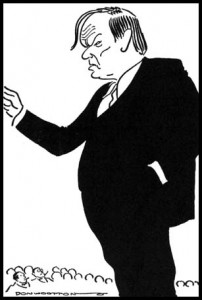 State courts in Maryland and Indiana have recently broken new ground in the right-to-counsel area. First, a trial judge in Baltimore ruled inRichmond v. District Court that indigent defendants have a Sixth Amendment right to be represented by counsel at bail hearings. The decision is described in more detail at The Blog of Legal Times. Additional coverage appears in The Daily Record.
State courts in Maryland and Indiana have recently broken new ground in the right-to-counsel area. First, a trial judge in Baltimore ruled inRichmond v. District Court that indigent defendants have a Sixth Amendment right to be represented by counsel at bail hearings. The decision is described in more detail at The Blog of Legal Times. Additional coverage appears in The Daily Record.
Second, the Indiana Supreme Court ruled in Hopper v. State that defendants who wish to waive their right to counsel and plead guilty must be advised of the benefits of having a lawyer during plea negotiations. The United States Supreme Court had previously rejected such “formulaic” requirements for a valid waiver of the right to counsel in Iowa v. Tovar, 541 U.S. 77 (2004). However, unlikeTovar, the new case was decided not on Sixth Amendment grounds but on the basis of the Indiana Supreme Court’s general supervisory authority over lower state courts.
If it is affirmed on appeal and replicated in other jurisdictions, the Baltimore ruling is likely the more significant of the two.
In many busy urban courtrooms, counsel is not routinely made available during bail hearings, so a constitutional requirement to provide counsel would potentially impose a major new burden on some public defender offices. However, there are good reasons to believe that defendants benefit a great deal from effective representation in pretrial release determinations. For instance, research indicates that defendants who are represented at bail hearings are more likely to secure release. Douglas L. Colbert et al., Do Attorneys Really Matter? The Empirical and Legal Case for the Right to Counsel at Bail, 23 Cardozo L. Rev. 1719 (2002). In turn, release makes it more likely that defendants will hold onto their jobs while criminal charges are pending and be able to work effectively with counsel to develop defenses in preparation for trial. Not surprisingly, then, the failure to secure pretrial release correlates with higher conviction rates and higher incarceration rates. Hans Zeisel, Bail Revisited, 1979 Am. B. Found. Res. J. 769.
All of this suggests that defendants gain significant advantages from representation at the bail hearing. Society may also benefit. If lawyers can help judges to get the information they need to make good pretrial release decisions, then society may be spared the expense of pretrial detention in cases in which it is not truly necessary. Likewise, if pretrial release tends to result in lower conviction rates and lower incarceration rates, that may mean fewer wrongful convictions and fewer unnecessary prison terms.
The Baltimore decision builds on the Supreme Court’s recent decision in Rothgery v. Gillespie County, 128 S. Ct. 2578 (2008), which held that the Sixth-Amendment right to counsel “attaches” at “the first appearance before a judicial officer at which a defendant is told of the formal accusation against him and restrictions are imposed on his liberty,” whether or not a prosecutor is present. The Baltimore decision apparently goes beyond Rothgery, though, because the Supreme Court indicated that “attachment” does not per se imply that a lawyer must be present. Rather, “counsel must be appointed within a reasonable time after attachment to allow for adequate representation at any critical stage before trial.”
Is the bail hearing a “critical stage”? At least one judge in Baltimore thinks so.
Cross posted at Life Sentences.
